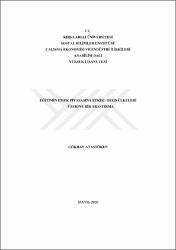| dc.contributor.advisor | Yalçın, Esin Cumhur | |
| dc.contributor.author | Ataştöken, Gökhan | |
| dc.date.accessioned | 2021-12-11T19:41:41Z | |
| dc.date.available | 2021-12-11T19:41:41Z | |
| dc.date.issued | 2020 | |
| dc.identifier.uri | https://tez.yok.gov.tr/UlusalTezMerkezi/TezGoster?key=Eb5EkakJlp3olBdo_wNEGYPthOI542qxp_4L_V9YoS2CSJARjYD8VFaHWrsVCTrw | |
| dc.identifier.uri | https://hdl.handle.net/20.500.11857/1530 | |
| dc.description | YÖK Tez: 627827 | |
| dc.description.abstract | Araştırma, eğitimin emek piyasaları üzerindeki etkisini ölçmeyi amaçlamaktadır. Araştırmada 35 OECD ülkesi örneklem olarak seçilerek, 2017 yılı veri seti ile çalışılmıştır. İlgili veri seti OECD istatistiklerinde yer alan Daha İyi Yaşam Endeksi alt değişkenlerinden elde edilmiştir. Araştırmaya konu olan hipotezler SmartPLS programından faydalanılarak Yapısal Eşitlik Modellerinin kullanılması ile test edilmiştir. Eğitim değişkeni; eğitime katılma oranı, öğrencilerin becerileri ve eğitimde geçen yıl alt göstergeleri ile incelenmiştir. Emek piyasası dinamikleri ise; işgücüne katılma oranı, istihdam oranı, uzun dönemli işsizlik oranı ve işe bağlı kazanç alt göstergeleri üzerinden ölçülmüştür. Araştırmanın sonucunda OECD üyesi ülkelerde 2017 yılı Daha İyi Yaşam Endeksi verilerine göre eğitim; emek piyasasının pozitif dinamiklerini pozitif yönde etkilemektedir. Eğitimde meydana gelen iyileşmenin ülkedeki istihdam oranını ve işe bağlı kazançları arttırdığı gözlenmiştir. Diğer yandan eğitimin emek piyasasındaki negatif dinamikleri ise negatif yönde etkilediği gözlenmiştir. Başka bir ifade ile eğitimde meydana gelen bir iyileşme, uzun dönemli işsizliği ve emek piyasasına olan güvensizliği azaltmaktadır. | |
| dc.description.abstract | The study was carried out with a 2017 data set, with 35 OECD countries selected as samples to measure the effect of education on labor markets. The relevant data set was derived from the Better Life Index sub-variables contained in OECD statistics. The hypotheses that are subject to the study have been tested using structural equality model using the SmartPLS program. The education variable was analyzed in terms of participation in education, student skills and years in education sub-indicators. Labor market dynamics were measured through sub-indicators of labor force participation rate, employment rate, long-term unemployment rate and job-related earnings. As a result of the study, according to the Better Life Index for 2017 in OECD member countries, education positively effects the positive dynamics of the labor market. It has been observed that improvement in education increases the employment rate and job-related earnings in the country. On the other hand, education negatively effects the negative labor market dynamics. In other words, an improvement in education reduces long-term unemployment and labor market insecurity. | |
| dc.language.iso | tur | |
| dc.publisher | Kırklareli Üniversitesi | |
| dc.rights | info:eu-repo/semantics/openAccess | |
| dc.subject | Çalışma Ekonomisi ve Endüstri İlişkileri | |
| dc.subject | Labour Economics and Industrial Relations | |
| dc.subject | Eğitim | |
| dc.subject | Education | |
| dc.subject | Eğitim sektörü | |
| dc.subject | Education sector | |
| dc.subject | OECD ülkeleri | |
| dc.subject | OECD countries | |
| dc.subject | Yapısal Eşitlik Modeli | |
| dc.subject | Structural Equation Model | |
| dc.subject | İş gücü piyasası | |
| dc.subject | Labour market | |
| dc.title | Eğitimin emek piyasasına etkisi: OECD ülkeleri üzerine bir araştırma | |
| dc.title.alternative | The effect of education on labor market: A research on OECD countries | |
| dc.type | masterThesis | |
| dc.department | Enstitüler, Sosyal Bilimler Enstitüsü, Çalışma Ekonomisi ve Endüstri İlişkileri Ana Bilim Dalı | |
| dc.identifier.startpage | 1 | |
| dc.identifier.endpage | 80 | |
| dc.relation.publicationcategory | Tez | |
| dc.institutionauthor | Ataştöken, Gökhan | |



















